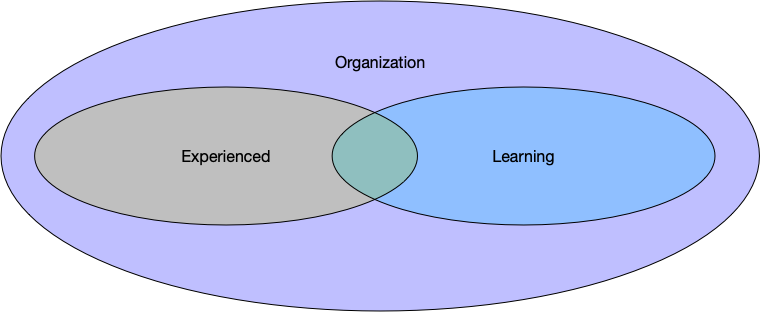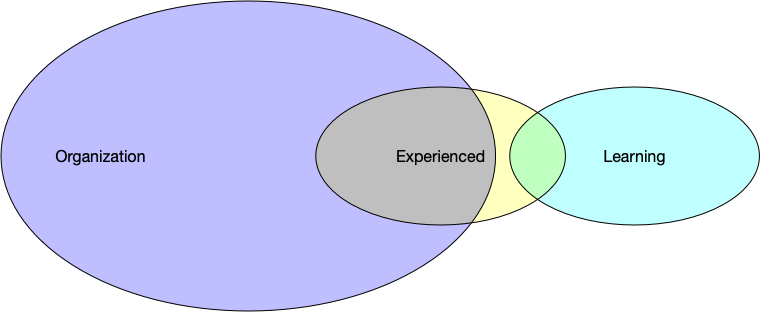Growing with your company’s complexity.

When finishing up a difficult project, I sometimes pause to dream
about how it’ll nudge my career forward. My thinking advances
down the storyline of “If I bundle this project with a few others, mix in good team health,
add a dash of time for the flavor to deepen, and undoubtedly this
will get me to the coveted next level.”
Then I’ll take a few minutes to savor the future.
Dreaming about my career, it’s always about the next step forward,
operating from the baseline assumption that progress is inevitable. However,
in the fast-growing companies I’ve worked at,
this hasn’t always been the case. The opportunities arose, but the folks currently doing
the work often didn’t receive them.
As a business’ complexity rapidly grows,
folks in important organizational roles often struggle to learn quickly enough to
remain effective in their current roles. In such cases, opportunities moved
on to someone else who was currently available, often someone newly hired into the company.
The difficulty of retaining your role during rapid growth is
usually discussed in hushed tones filtering out from dark corners,
but there are some straightforward steps you can take to
raise your chances of growing successfully alongside your role’s complexity.
From learning to experienced

Everyone has some set of tasks that they’re already experienced doing, and another set
that they’re still learning. In most jobs, you generate value when you’re performing
tasks you’re experienced with, and you’re generating future value when you’re
performing tasks you’re learning.
As you learn, you become experienced at more and more tasks, shrinking the learning bucket,
and making you more effective in your current role.

In an ideal career, you find yourself progressing up the difficultly curve,
such that you are always doing some stuff you’re good at, and undertaking some new work.
This is the oft-cited stuff of Mihaly Csikszentmihalyi’s Flow,
and correlates with a rewarding career.
But it’s not just you.
There is also the organization around you, and that organization
is composed of many other folks who are all learning as well.

Sometimes, especially early in your career, your learning is entirely
within areas the broader organization already knows well.
Whenever you have a problem, there are many other folks you can turn to for answers and advice.
This is a great place to start out and learn very rapidly.
(Depending a bit on your learning style.)

In small companies, or as you get deep into your carer, you often find yourself experienced at tasks that
the broader organization is unfamiliar with. This is a tricky time, because the organization depends on you
to deliver the work that only you’re experienced with, while simultaneously depending on you to rapidly learn
new skills that no one in the organization can teach you.
This is when folks start falling behind in their role’s growth.
The consequences here are significant. The person in that role will often become a bottleneck
on the company’s execution, and their rate of learning will decrease even more as they refocus
on work they’ve already mastered. Burning the midnight oil, their
excitement for the job will decrease. That frustration will often be compounded by
new tasks that still need to get done, but they can’t get around to.
If this goes on long enough,
the company must hire an external candidate who is either already experienced or has the time to learn.
In a clash of fairness and efficiency,
the external candidate doesn’t need to be more skilled or experienced than
the internal candidate, rather the existance
of the internal candidate frees the external hire from performing some set of the tasks,
allowing them the space to grow that the internal candidate can’t muster.
Typically when the leader of an organization fails to scale with it, they are left in place,
while some aspects of the role are shifted away. As a result, it’s often the case
that any manager’s failure to scale with the company can unintentionally cram down an entire organization’s
career growth.
How do we escape this trap?
Working on the system
Your goal as a leader is to offload work that you are experienced
at to the wider organization as rapidly as possible, freeing up room for you to
continue learning. The E-Myth Revisited
calls this “working on the system,” and it’s one of the best ways to ensure
you’re continually shedding tasks that you’ve become experienced with.
Some examples of high-leverage work that continues to be highly valuable
as your role’s complexity grows:
- Ensuring your organization’s work aligns with your users needs.
- Aligning the approach of teams through visions and strategies.
- Setting goals and metrics to agree on aims and expectations.
- Mentoring and training the team you support.
- Recruiting and hiring folks with missing skillsets.
- Creating a new program and documenting it for handoff.
If you’re spending most of your time on those activities, you’re heading in the right direction.
Conversely, some examples of getting caught working in the system are:
- Making routine decisions that come up frequently, which I sometimes refer to as working the exceptions.
- Specifying the details of approach for specific teams through tasks, sprints or other single-team
artifacts and processes. (Unless you’re currently managing a single team!) - Running a long-standing program that requires your ongoing personal attention to keep functioning.
- Recruiting for roles that need to be hired in volume, and which you’ve already developed
an effective system for hiring.
There is some nuance here. Often you’ll hear folks say that they want to be more
strategic, and then they stop doing a bunch of critical work. That’s not the solution here.
The goal is to solve for the work you’re experience with, not to abandon it.
Hire experienced people
Sometimes folks start hiring too early and end up bloating their organization
with too much management. That’s a well-known story
and it ends in tears.
However, it’s life changing to hire a couple of folks who are more experienced
than you are, particularly those who are skilled in areas where you’re weaker.
Many leaders in fast growing organization are concerned that more experienced folks won’t
want to report to them, or that they’ll get displaced by their more experienced reports.
This can happen, but it’s almost certainly the case that if you don’t hire them, you’ll fail to scale with your
organization and get layered over anyway.
Learn, learn, learn
Now that you have some strategies to free up your time from existing work,
it’s time for you have to figure out how to optimize for learning.
Your learning style is very personal, and figuring out how you learn quickly
is something that you’ll have to spend time figuring out, but I can share
what has worked for me:
- The various tasks that comprise “working on the system”
let me think about new context and rethink how previous choices
fit into that context, and I learn a lot from that. - Partnering with folks I support and my peers on project to learn from them.
When I’m caught up in execution mode, I often try to do work alone to get it
done as quickly as possible, but I rarely learn that much. And I’m missing an opportunity to teach. - Meeting people who are doing similar work at other companies
and benchmarking each others’ approaches. - Reading stuff from others who’ve dealt with the same problems.
- Writing down what I’m struggling with to crystalize my thoughts.
That said, the majority of my learning occurs while working through the challenges of my daily work,
and I think that’s an important goal to optimize for when trying to learn quickly enough
to remain in-role at a growing company.
Trying to do all your learning outside of work is really hard, and in the long run,
most folks find that the demands on their time and energy don’t support learning
outside of work as a means to keep up with this sort of rapidly growing role.
If you’re someone in a role that keeps getting more complex,
it’s normal for it to be difficult. It’s normal to make more
mistakes than you’re comfortable with. It’s normal to feel
frustrated when thrust towards another new and difficult task.
Certainly some folks have been outgrown by their company, and it’ll
happen to more folks in the future, but I believe it’s far from inevitable.
If you keep focused on learning and building systems behind you,
then it’s possible to scale yourself more and more quickly than
I would have ever imagined.
